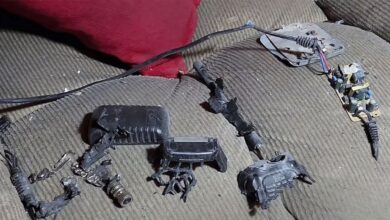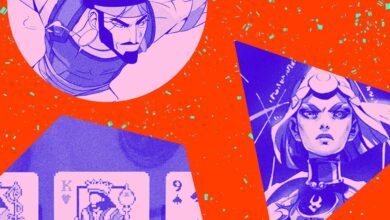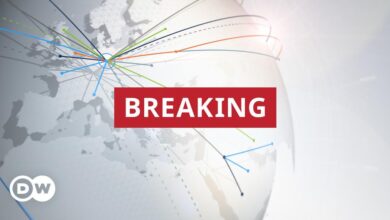Justin Trudeau, Facing Dissent Within His Party, Announces Resignation As PM

Ottawa, Canada:
Justin Trudeau resigned today as the leader of his Liberal Party of Canada effectively ending his nine-year tenure as Canada’s Prime Minister too. He now remains caretaker prime minister till his successor is chosen. The move comes amid rising dissent against him within his party. He held a press conference today outside his residence at Rideau Cottage in Ottawa where he made the announcement in English and French.
“I have informed my party and the Governor that I intend to resign as leader of the party as well as prime minister of Canada, and will do so as soon as the my successor is appointed through a robust nationwide competitive process,” Mr Trudeau said.
Mr Trudeau, 53, went on to say that although he is a “fighter”, the parliament under his leadership is completely “paralysed”.
“I hereby prorogue the Parliament until March 24 in order to initiate the process of finding a new leader to lead the party and Canada until elections scheduled for later this year,” he added.
He further stated that “A new prime minister and leader of the party will carry its values and ideals into the next election, and I am excited to see that process unfold.”
Speaking about his regrets, Justin Tudeau said “If I have one regret… I do wish that we’d been able to change the way we elect our governments in this country”, adding that “Voters should be allowed to pick their second and third choices on the voting ballot itself, instead of the current system, which is set up to play to the advantage of those who want to polarise the situation and play Canadians against each other.”
According to Canada’s legislature, in such a case, the ruling party gets 90 days from the date of resignation of its leader to find a replacement.
THE LIKELY CONTENDERS TO REPLACE TRUDEAU
Dominic LeBlanc, Melanie Joly, Francois-Philippe Champagne, and Mark Carney have been floated as potential contenders.
Dominic LeBlanc is the Minister of Intergovernmental Affairs of Canada. He has also been serving as the minister of finance since December 2024, when his colleague Chrystia Freeland had resigned after differences with Justin Trudeau.
Melanie Joly is the Minister of Foreign Affairs. She has held that post since October 2021. Ms Joly represents the Montreal-area in the House of Commons and has been a parliamentarian since 2015.
Francois-Philippe Champagne is the Minister of Innovation, Science and Industry. He was also the foreign minister of Canada between 2019 and 2021. He is a businessman, lawyer, and international trade specialist.
Mark Carney is the former governor of the Bank of Canada from 2008 to 2013. He has also served as the governor of the Bank of England from 2013 to 2020.
A JAB AT THE OPPOSITION
In his resignation speech, Mr Trudeau didn’t miss an opportunity to target the leader of Canada’s opposition Conservative Party, Pierre Poilievre. “Stopping the fight against climate change does not make sense and backing off on the values and strengths on diversity is not the right path,” he said, adding that “Pierre Poilievre’s vision for Canada is not the right one.”
“We need an ambitious, optimistic view of the future and Pierre Poilievre is not offering that,” Mr Trudeau claimed.
THE REBELLION WITHIN THE LIBERALS
Justin Trudeau has been facing immense pressure from his party colleagues as latest opinion polls show an overwhelming surge in support for the opposition Conservative Party. Canada will go to polls later this year and must have a new government in place before October 20.
Mr Trudeau will continue as prime minister temporarily till a successor is chosen. This could take as little as a few days and may even extend to a few months. Canada’s internal politics as well as the country’s geopolitical standing has taken a severe and damaging blow under Mr Trudeau’s leadership.
A few months ago, Justin Trudeau lost the support of his key ally leading to a vote of no-confidence against the prime minister in Parliament. Somehow managing to garner the fragile support of other small parties to form a coalition, Mr Trudeau’s minority government survived. This began a process of introspection within the Liberal Party, with several MPs unhappy with the way Justin Trudeau was managing the party and the country.
Dissatisfied with his leadership in the last many months, several senior Liberal Party MPs, including Sean Casey, Ken McDonald and Chandra Arya had publicly called for Justin Trudeau to step down. More than 20 Liberal Party MPs even reportedly signed a petition demanding his resignation.
The death knell however, was the resignation of Chrystia Freeland, Justin Trudeau’s Deputy Prime Minister and Finance Minister in December. Ms Freeland’s departure stemmed from policy disagreements, including Mr Trudeau’s handling of potential US tariffs and his economic strategy. She slammed Mr Trudeau and his “costly political gimmicks” in her resignation letter.
The Canadian dollar, which had been on a downward spiral since September and was at a new-low, has appreciated since Trudeau decided to step down as leader of the Liberal party and in-turn the prime minister.
Canada’s economy, which is already facing problems like slowing growth, high inflation, a stagnant GDP, and crumbling trade policies, is now also facing an existential crisis with Donald Trump threatening massive tariffs.
On more than one occasion, Donald Trump has called Canada as the 51st state of the United States. He had even called Justin Trudeau the “Governor of the 51st US state” in a face-to-face meeting with him. Mr Trump had said that Canada is surviving on exploiting the trade policies it has with the US, and he intends on setting that right. He even said that if Canada cannot cope, then it should become another state of the US. Days after the shocker, Justin Trudeau responded, but was slammed by the opposition and criticised by his own party for being too mild.
Even Elon Musk, who is part of Donald Trump’s incoming administration, called Justing Trudeau “an insufferable tool”.
SOURING TIES WITH INDIA
Tensions between New Delhi and Ottawa have been simmering since Trudeau’s September 2023 allegation of Indian involvement in the killing of Khalistani terrorist Hardeep Singh Nijjar. Nijjar was shot outside a Gurdwara (Sikh temple) in Canada. India dismissed the accusation as “absurd.” Trudeau’s claims that India sponsors criminal activities have drawn sharp criticism both domestically and internationally.
In the subsequent fallout, India expelled six Canadian diplomats and recalled its envoy to Ottawa after Canada attempted to question Indian officials as “persons of interest” in the Nijjar case. Pro-Khalistan activities in Canada, including an attack on a Hindu temple near Toronto, further inflamed relations between the two nations.
India has consistently rejected any link to the murder of Nijjar, a designated terrorist by the National Investigation Agency (NIA), and accused Trudeau’s administration of pandering to Khalistani sympathisers for political gain.
Despite multiple exchanges, including meetings at international forums like the G20 Summit, Canada has failed to provide any conclusive evidence linking India to the murder.
Critics argue that these allegations are an attempt to appeal to a segment of the Sikh community who are ‘Khalistan’ sympathisers and a “vote bank” in Canada, a move that some perceive as politically motivated. Justin Trudeau was seen on multiple occasions attending the congregations of the separatist movement and supporting them. However, this strategy appears to have backfired, with many Canadians viewing it as a distraction from pressing national issues.




